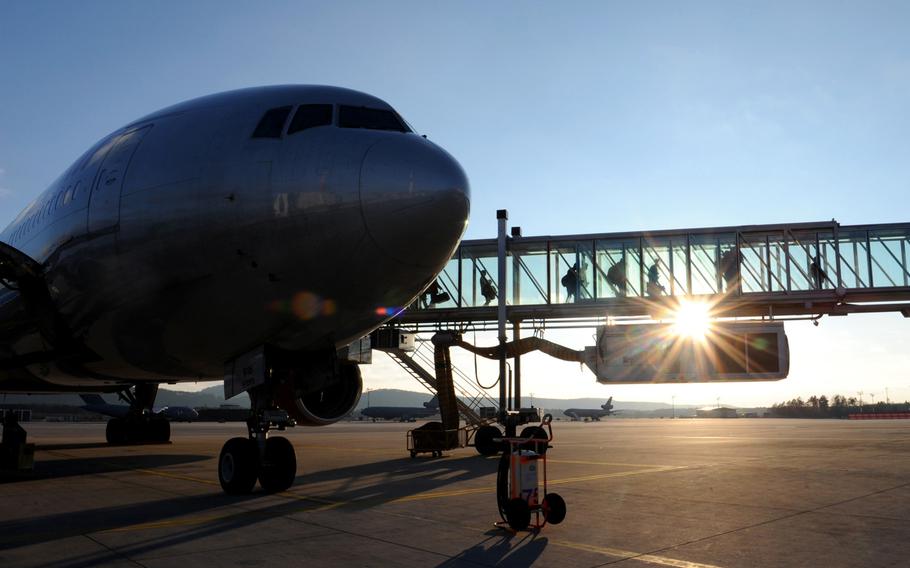
Passengers arrive at Ramstein Air Base, Germany, in 2015. U.S. military personnel bound for assignments in Europe are not expected to be affected by an EU travel ban on Americans that took effect Wednesday, July 1, 2020, military officials said. (Michael Stuart/U.S. Air Force)
Stars and Stripes is making stories on the coronavirus pandemic available free of charge. See other free reports here. Sign up for our daily coronavirus newsletter here. Please support our journalism with a subscription.
STUTTGART, Germany — U.S. military personnel bound for assignments in Europe won’t be affected by a new European Union travel ban on Americans, officials said.
Status of Forces and bilateral agreements with countries mean “we don’t anticipate any direct impacts on U.S. personnel,” U.S. European Command said in a statement after the EU travel restriction went into effect Wednesday.
The restrictions also “should not apply” to long-term EU residents and their family members, or “to people with an essential function or need,” including health care workers, seasonal agricultural workers, researchers and diplomats, the European Council said. Military personnel are on the list of essential workers, said the EC, one of the main decision-making bodies of the EU.
The ban on American visitors was imposed to prevent a resurgence of the coronavirus in Europe, where case numbers and transmission have fallen sharply from a peak several weeks ago. The restrictions will be reevaluated and updated every two weeks, the EC said.
If new cases of the coronavirus are “close to or below the EU average” over a period of 14 days, the U.S. will be added to the list of countries whose citizens can travel to the EU.
But the likelihood of that happening soon is slim. New cases of the virus have spiked in the U.S. after several states lifted lockdown restrictions. Dr. Anthony Fauci, a member of the White House coronavirus task force and head of the National Institute of Allergy and Infectious Diseases, told a congressional hearing Tuesday that, if steps are not taken to slow the spread of the virus, the U.S. could see 100,000 new cases a day – double the current number.
The announcement of the travel ban on Americans comes as the Defense Department tries to unwind a substantial backlog of troops and DOD civilians waiting to move to new assignments around the world. The backlog was created by a Pentagon order halting military moves and other nonessential travel in the spring, when Europe was bearing the brunt of the pandemic and cases in the U.S. were still relatively low.
Italy, which in the spring had the highest death toll in the world from coronavirus, along with Germany and Poland are hubs for U.S. troops in Europe. As of Thursday, the U.S. had the highest number of confirmed cases of coronavirus in the world — 2,686,587 out of 10.7 million worldwide — and 128,062 deaths out of a global total of 516,552, according to a tally compiled by Johns Hopkins University.
EUCOM says the military is taking precautions “to ensure we maintain the trust and confidence of our host nations.”
As an example, recently arrived troops with the 101st Airborne’s 101st Combat Aviation Brigade are isolated in small groups for two weeks in Grafenwoehr, before moving to forward locations in other parts of Europe.
vandiver.john@stripes.com Twitter: @john_vandiver